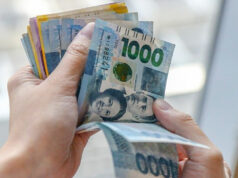‘Tatay Digong’ thrives on pathos to keep rock-star status
By Norman P. Aquino
Associate Editor
JUN ABORDO’s eyes beam as he talks about how his “Tatay Digong” managed to end the Philippines’ century-old subservience to the United States, its former colonial master.
Mr. Abordo, who’s been working as a messenger for an electricity distributor in Manila, the capital, admits though that he doesn’t agree with all of President Rodrigo R. Duterte’s actions in the past.
“I praise him for killing all the drug pushers of this country, but I strongly disagree with how he has handled our territorial dispute with China,” Mr. Abordo says while resting under a giant acacia tree on a hot Saturday afternoon, perspiration running off his face.
“But as a whole, Duterte has done Filipinos more good than any other presidents before him despite his brash comments against women, the Catholic Church and God himself,” he says as a matter of fact.
VISCERAL SUPPORT
The 74-year-old Philippine firebrand leader has kept his sky-high ratings halfway through his six-year term even after describing God as “stupid,” rebuking church leaders for criticizing his deadly war on drugs and displaying his machismo by kissing women in public.
Mr. Duterte’s penchant for making lewd remarks is often met by laughter from the crowd who admire him for speaking his mind, and has resulted in copycat behavior by his officials.
His steady approval ratings — 85% in the latest Pulse Asia Research, Inc. poll — come despite what his critics consider as a head-in-the-sand response to Chinese aggression in the disputed South China Sea.
“Many supporters’ connection with Duterte is emotional and visceral, not based upon a cost-benefit judgment of his policy performance,” said Malcolm Cook, a senior fellow at the ISEAS-Yusof Ishak Institute in Singapore.
“They see him as one of them and as their leader. Hence why he is widely referred to as tatay or daddy.”
Since taking power in 2016, Tatay Digong — a term of endearment conceived by his rabid supporters — has deviated from the foreign policy of his predecessor, Benigno S.C. Aquino III, by seeking closer investment and trade ties with Beijing, including over resources in the South China Sea.
The Philippines under Mr. Aquino had sued China before an international arbitration tribunal over its territorial claims, and won. He also strengthened the Philippines’ alliance with the US to try to check China’s expansion in the major waterway.
Majority of Filipinos seem to agree with Mr. Aquino’s stance, thinking that the country should try to regain islets occupied by China and assert its rights in the sea. The proportion of Filipinos who think that way has risen to 93% in June from 89% in December, according to a Social Weather Stations poll.
China has been building artificial islands in the disputed Spratlys and setting up installations including several runways. It claims sovereignty over more than 80% of the South China Sea based on its so-called nine-dash line drawn on a 1940s map.
POLITICAL WILL
According to Mr. Cook, the tough-talking president’s high popularity despite the Filipino majority’s sentiment against China suggests that people don’t put too much weight in the issue of territorial defense when they appraise Mr. Duterte’s performance.
From a list of Filipinos’ top 15 concerns for government action, territorial integrity came in at No. 13, according to a Pulse Asia poll in March 2017.
But despite all his faults, no one can dispute Mr. Duterte’s commitment to action.
“Duterte has had accomplishments on the ground and his political will has been a major factor,“ said Ramon C. Casiple, executive director at the Institute for Political and Electoral Reform in Manila.
The economy has grown more than six percent under Mr. Duterte, who has also managed to ease Muslim rebellion in the south by creating a new autonomous region with greater powers.
Major crimes including murder and rape have declined by 58% in Metro Manila during the first 35 months of his term, according to the police.
“Mr. Duterte has yet to create a legacy for himself and he has another three years to do that, “ Mr. Casiple said. “He is likely to get a number difficult bills in Congress passed including charter change, and tax reform.”
But ISEAS-Yusof Ishak Institute’s Mr. Cook thinks that Mr. Duterte should do less and focus more on fewer key goals.
“Dropping charter change and federalism, neither of which has popular support, would be good.” he said.
“Putting more presidential effort into economic reforms like the Trabaho and land use bills, and changes to foreign investment rules would leave him with a better legacy.”



